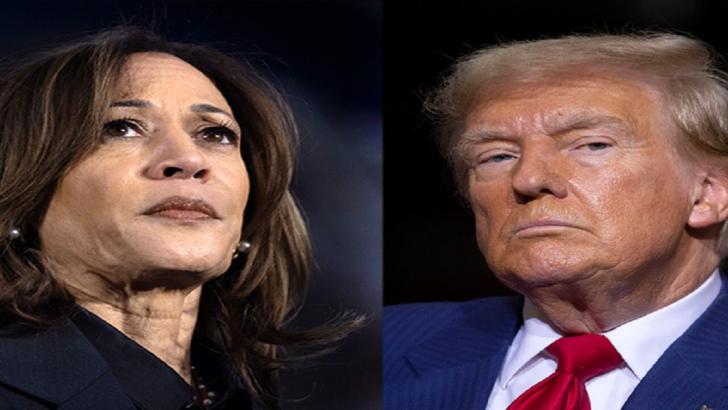US Politics: Six reflections on Trump's historic election victory

Following a fortnight off to recuperate from 2024's political betting marathon, Paul Krishnamurty is back with six reflections on Donald Trump's historic US election victory...
-
Betfair's politics betting expert Paul Krishnamurty on the lessons learned
-
An extraordinary achievement by Trump
-
What are the implications for 2028?
My US election 2024 bets
It was a very disappointing end to a great election for me. Earlier, I'd banked over 400 units profits, thanks to big odds trades on Kamala Harris for the presidency and nomination, plus J.D. Vance to be Trump's VP pick.
However, I then reinvested it all and another 80 units on a new pro-Harris position plus a complex series of bets, intended to double up as hedges. They drew a complete blank. The one meaningful risk was Trump sweeping the swing states without ever finding an attractive cover bet during the in-play period. Which is exactly what happened.
No regrets. A similar 'complex hedging' plan worked perfectly in the UK election and could easily have landed here. I reiterate that this is a smart way to bet on elections. Identify the targets for each party which you most fancy, then spread the risk around.
On this occasion, that didn't work. If Harris either won just Michigan and/or the popular vote, the plan would have worked, certainly been a lot cheaper and potentially landing a big profit. It didn't because, while I was always very open to Trump winning the electoral college, I dismissed his chance of the popular vote. My bad. Onwards.
Betfair Exchange market on US election was right
On a broader level, this was a triumph for the predictive powers of betting markets. The vast gamble on Trump from around three weeks out, prompting a higher probability than projected by polls, was vindicated.
Trump's 2016 victory remains the only time the US Election favourite on Betfair, 100 days out, has lost. As in 2020, the market proved a better guide to his performance than the polls.
The below Betfair Predicts graph shows how Trump established his position as favourite after recovering from the only debate and never relinquished it.
Incumbency proved too big a hurdle for Harris
Instant post-mortems are always prone to emotive over-reaction, and that was predictably evident from many takes, particularly mainstream, soft Democrat-minded commentators. All elections need to be analysed within their context and, all things considered, there's nothing to say Harris fared any worse than any known alternative.
The 2020 election produced record turnout amid a pandemic, in the wake of mass protests and riots. With Trump in the White House, opposition was stoked and united. On reflection, it is quite logical that turnout would fall, particularly on the Democrat side. That meant, as seen around the world, the incumbent would fall back.
With Trump making inroads among minorities, the numbers simply weren't there for Harris. Given the context, her performance was respectable. Not only was it impossible to distance herself from the unpopular Joe Biden administration legacy, but it would have been absurd and blatantly dishonest to do so.
Rather than blame her, credit Trump for a third straight extraordinary electoral achievement. To increase his vote tally again, in his third election, is something nobody would have considered realistic before Trump entered politics.
Trump's unique appeal
I am more convinced than ever that the key explanation stems from Trump's unique fame, celebrity, omnipresence in the public conversation. People who are disengaged from politics come out for him, but not other Republicans on the same ballot. These voters are very hard to reach, creating a nightmare for pollsters and conventional politicians.
Therefore, finding a successor to Trump will not be easy for Republicans. Expect a series of copycat far-right flamethrowers to raise their profile, with nothing like the impact. J.D. Vance is favourite for 2024, but has miniscule public appeal.
The end of centre-right politics?
That may provide encouragement to the anti-Trump, pro-NATO wings of the party but, if so, they are probably delusional. Their best, from politicians to army generals to the previous Trump cabinet threw everything at stopping him, and utterly failed. Now he is humiliating them with one appointment after another.
The path back is not clear and Liz Cheney may have been right to moot the idea of creating a new party.
Will Dems dare pick a woman again?
Democrats are looking for explanations and scapegoats. Often they are ignoring the above points. Harris lost due to incumbency, the Biden legacy, a world on fire and Trump's unique appeal.
Inevitably, some blame racism and misogyny, arguing that a black woman was fundamentally disadvantaged. True or not, this result will make winning a future nomination much harder for a woman. Twice, Democrats picked one with both resulting in shattering losses to Trump.
It is no surprise to see men heading the 2028 US election winner market, with the impeccably qualified Democrat Governor of Michigan Gretchen Whitmer down at 30.029/1.
Perhaps they should pick a celebrity, among whom they have no shortage of supporters. George Clooney, who played a key role in replacing Joe Biden with Kamala Harris, is an obvious candidate, were he to actually want the job.
The first post-legacy media election
This campaign, the tactics and their effect, were like no other. Trump did one TV debate, rejected doing more, or the sacrosanct 60 Minutes interview, plus several invitations to the traditional TV networks.
Swerving those conventional gigs quietened the hostile reaction and mockery, which followed almost every previous debate or mainstream media appearance. Breaking the unwritten rules worked.
Instead, Trump was laser-focused on his base and target audience of young men. His multiple podcast appearances, most notably Joe Rogan, may have been the decisive factor. A reminder that in the forthcoming New World Order, old rules do not apply.
Now read more politics betting articles from Betfair experts
GET £50 IN FREE BETS MULTIPLES WHEN YOU SPEND £10 ON THE BETFAIR SPORTSBOOK
New customers only. Bet £10 on the Betfair Sportsbook at odds of min EVS (2.0) and receive £50 in FREE Bet Builders, Accumulators or Multiples to use on any sport. T&Cs apply.
Prices quoted in copy are correct at time of publication but liable to change.



